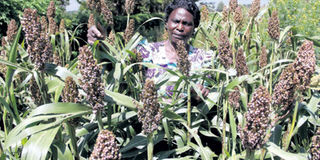Review sorghum-beer tax to save farmers

Rose Imbega inspects her sorghum crop in Bungoma County. FILE PHOTO |
What you need to know:
- The Senator keg then sold well particularly to the low-end consumers because it had earlier been exempted from excise duty by the government to make it cheap in a bid to offer competition to illicit brews that were killing and blinding hundreds of people at the moment.
- According to the government, the main reason for reintroducing the tax was because it was difficult administratively to differentiate between Senator keg and other beers, thereby posing a threat to revenue collection.
- Economic analysts have estimated that in the season 2013/14, sorghum farmers have been forced to forgo some Sh180 million, because their cereal was not bought by the breweries.
Climate change has always been known to bring misfortunes and suffering to people.
But in semi-arid Eastern Kenya and parts of Nyanza, farmers were already smiling all the way to the bank to earn from a crop introduced following a climate change related research, until the government imposed a heavy duty on the end product of the crop.
A sorghum variety known as gadam was first introduced from Southern Sudan in the 70s in a bid to boost food security. But farmers never took it up until 2009, when scientists from the Kenya Agricultural and Livestock Research Organistion (KALRO), formally Kari, reintroduced it through a research aimed at identifying the most climate resilient sorghum variety for climate change adaptation.
And after successful trials, it was accepted by farmers in some dry-land areas, where the good yields prompted the East African Breweries Limited to start using the cereal to make its Senator beer brand.
The new market saw the price of the cereal shoot from Sh7 a kilo in 2009 to Sh24 a kilo in 2012 (far higher than maize in any given harvesting season in Kenya)— making it a highly lucrative cash-crop that yields well in dry-land areas, matures fast, and can also be used as food.
BID TO OFFER COMPETITION
The Senator keg then sold well particularly to the low-end consumers because it had earlier been exempted from excise duty by the government to make it cheap in a bid to offer competition to illicit brews that were killing and blinding hundreds of people at the moment.
This called for huge volumes of sorghum for manufacturing the drink, thus offering smallholder farmers an opportunity to earn from a crop that was for years considered a preserve of the poor man.
The farmers’ joy lasted until early this year, when the same government reintroduced a 50 percent excise duty on Senator keg through the Customs and Excise Amendment Act 2013.
The legislation, which came into force in January this year, forced the breweries to raise the cost of the drink substantively— thereby shelving up to 75 percent of its patrons, who abandoned it probably to settle for a cheaper option.
And now, with the remaining 25 percent of the consumers, the breweries says the available stock that was to be used this year can now serve the shrunk market for the next three years.
This development did not go down well with smallholder farmers who had dedicated better parts of their land to sorghum, and borrowed loans to expand acreage by leasing more land.
This is because firms which buy the cereal from farmers to sell to the breweries have now been forced to reduce contracted farmers from 20,000 early this year to 6,000.
According to the government, the main reason for reintroducing the tax was because it was difficult administratively to differentiate between Senator keg and other beers, thereby posing a threat to revenue collection.
EDUCATION CHALLENGES
But on the ground, some farmers who had now found an opportunity to start paying school and college fees for their children are already withdrawing them from the learning institutions since the source of income, which had seemed to brighten their future, is no more.
Unlike barley, which is the main cereal for making beer in Kenya, sorghum farmers are mainly smallholders— all of them from dry-land areas in Eastern and parts of South Nyanza.
Economic analysts have estimated that in the season 2013/14, sorghum farmers have been forced to forgo some Sh180 million, because their cereal was not bought by the breweries.
Generally, Joseph Opiyo, a Senior Research Assistant at Tegemeo institute of Agricultural Policy and Development – Egerton University says that introduction of the tax and subsequent withdrawal of a major buyer in the sorghum value chain has already led to income losses estimated at Sh3.4 billion.
As a result, the country risks adverse long-term effects of poverty, food insecurity, nutrition and unemployment as well as increase in number of children dropping out of school.
It is, therefore, imperative for the government to review downwards the excise duty to save the collapsing sorghum value chain, safeguard the money used on research and allow farmers to continue farming the crop which is a rare opportunity brought about by climate change.
Mr Esipisu is a journalist specialising in agriculture and climate change reporting. Email: [email protected]





